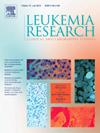Exploring the impact of methylation aging on acute myeloid leukemia: Insights from the aging clock
IF 2.1
4区 医学
Q3 HEMATOLOGY
引用次数: 0
Abstract
Acute myeloid leukemia (AML) is more commonly diagnosed in adults. Though there are considerable knowledge about the relationship between adult leukemia and aging, it is rarely studies in children as the occurrence of the disease is rare. Additionally, adult and pediatric AML are known to have different etiology. Studies show that in adult AML, methylation aging is accelerated compared to healthy people. However, this association has not been extensively studied in pediatric AML. To investigate potential correlations between pediatric AML and aging, we analyzed methylation aging clock models that leverage DNA methylation patterns and predict epigenetic age. By established knowledge, we observed that the predicted epigenetic age in adult AML cases exceeds the actual chronological age. Similarly, we found that predicted epigenetic age in pediatric AML cases was also higher than chronological age. In addition, we observed significant changes in the CpG probes of the Epi clock, and these changes were observed to be extensive hypomethylation. Based on this, we found that the Epi clock can recognize changes specific to AML. These findings may have implications for strategies to address aging and quality of life after treatment in pediatric AML patients.
探索甲基化老化对急性髓性白血病的影响:老化时钟的启示
急性髓性白血病(AML)通常在成人中确诊。尽管人们对成人白血病与衰老之间的关系有相当多的了解,但很少对儿童进行研究,因为这种疾病很少发生。此外,已知成人和儿童急性髓细胞白血病的病因不同。研究表明,与健康人相比,成人急性髓细胞白血病患者的甲基化老化速度加快。然而,这种关联在小儿急性髓细胞性白血病中尚未得到广泛研究。为了研究小儿急性髓细胞性白血病与衰老之间的潜在关联,我们分析了利用 DNA 甲基化模式预测表观遗传年龄的甲基化衰老时钟模型。根据已有的知识,我们观察到成人急性髓细胞性白血病病例的预测表观遗传年龄超过了实际年龄。同样,我们发现小儿急性髓细胞性白血病病例的预测表观遗传年龄也高于实际年龄。此外,我们还观察到 Epi 时钟的 CpG 探针发生了显著变化,而且这些变化被观察到是广泛的低甲基化。在此基础上,我们发现 Epi 时钟可以识别急性髓细胞性白血病的特异性变化。这些发现可能对解决儿科急性髓细胞性白血病患者治疗后的衰老和生活质量问题的策略具有重要意义。
本文章由计算机程序翻译,如有差异,请以英文原文为准。
求助全文
约1分钟内获得全文
求助全文
来源期刊

Leukemia research
医学-血液学
CiteScore
4.00
自引率
3.70%
发文量
259
审稿时长
1 months
期刊介绍:
Leukemia Research an international journal which brings comprehensive and current information to all health care professionals involved in basic and applied clinical research in hematological malignancies. The editors encourage the submission of articles relevant to hematological malignancies. The Journal scope includes reporting studies of cellular and molecular biology, genetics, immunology, epidemiology, clinical evaluation, and therapy of these diseases.
 求助内容:
求助内容: 应助结果提醒方式:
应助结果提醒方式:


